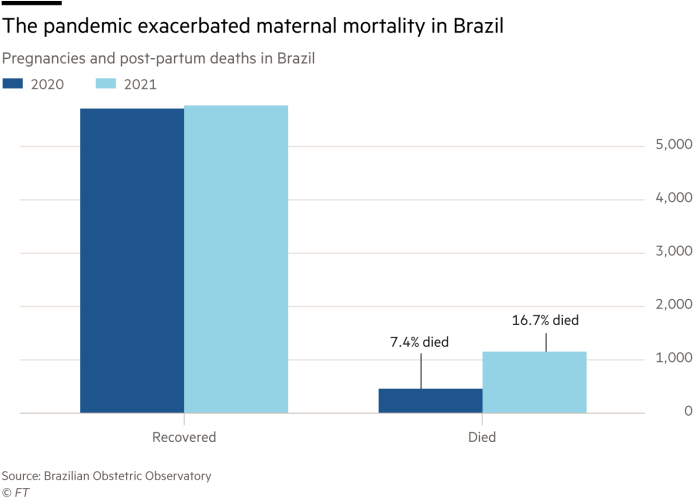
[ad_1]
After two difficult pregnancies, it looked like Vanessa de Oliveira Silverio might get lucky for the third time. But in her 34th week of gestation, she started to feel unwell and cough. A coronavirus test came back positive and breathing became difficult.
“She was very scared. She said she was afraid of dying, of having a cesarean [birth] and the baby does not survive, ”said her husband Douglas Silverio. Yet it was Vanessa, 33, who died during an emergency operation to deliver her baby in March.
Her death is one of hundreds of such tragedies that have befallen families in Brazil, resulting in a death rate among new or expectant mothers that has alarmed doctors and public health experts.
In total, more than 1,600 pregnant or postpartum women have succumbed to respiratory disease since the start of the pandemic, according to the Brazilian Obstetrics Observatory.
“Before the start of the pandemic, we already had a maternal mortality rate of 55.3 per 100,000 babies born alive, which is considered extremely high,” said Rossana Pulcineli Vieira Francisco, professor in the Department of Obstetrics and of Gynecology from the University of São Paulo who is leading the research.
“It is not possible to say with certainty that Brazil is the country where pregnant and postpartum women die the most from Covid, as there are not many population studies on death from Covid in these women, ”Francisco added. “But we can certainly say that the numbers here are very high.”
Overall, maternal deaths in Brazil were on average 10 per week in the country in 2020, according to the observatory’s analysis. This year, that number has quadrupled to over 40, as mortality in the general population has doubled.

Many of the explanations offered echo those for the wider coronavirus disaster in the country, which has already claimed more than half a million lives.
The death toll from Covid-19 in Latin America’s most populous country is the second highest in absolute terms after the United States, and the seventh per capita, according to the FT’s analysis.
In the case of pregnant women, experts blame the combination of a strained healthcare system, inadequate and uneven service delivery, lack of experience in treating such patients, and the circulation of a more contagious variant of the virus.
Dr Lílian Cristina Moreira, a pediatrician from Rio de Janeiro, said research has shown that about half of pregnant women in some Brazilian states who have died from coronavirus do not have access to an intensive care unit or to intubation.
“Out of 100 pregnant women diagnosed with Covid, 12 die. It’s very high. While in the population, the death rate is 2.8%, ”she said.

Pregnancy suppresses a woman’s immune system, leaving her more vulnerable to infectious diseases, while pressure on the abdominal organs and the diaphragm can restrict breathing. With greater inflammation, the body is under stress.
Although congenital Covid-19 infection is considered rare, mothers without symptoms can pass the virus to newborns. More than 600 Brazilian children under one year of age have died from the disease during the pandemic, according to government data.
Many experts have said they do not believe that the Gamma strain, or P. 1, of Sars-Cov-2, which originates from the Amazon, is inherently more harmful to pregnant women. But its greater transmissibility – about twice that of previous variants – has resulted in a wave of infections in recent months that has sometimes overwhelmed hospitals.
The effective shutdown of many regular health services during the pandemic also affected the availability of antenatal classes and family planning services, Moreira added.
“We believe that pregnant women were more vulnerable due to access to the health system and socio-economic status,” she said. “Black women and poor women are dead more.”
Even where the right facilities and equipment are available, medical staff are often unprepared to care for seriously ill pregnant women, said Marcelo Otsuka, doctor and coordinator of the Brazilian Society of Infectology.
Treatment involves finely balanced clinical decisions. What happened in the case of Vanessa de Oliveira Silverio haunts her widower, Douglas, who lives in the city of São José dos Campos, in the state of São Paulo. “The doctor said she was stable, then she died,” he said. “One of the doctors told me he didn’t know why the Caesarean section hadn’t happened sooner. If they had, would it have been more effective?
Fabiana Alves Sousa, from the poor northeastern state of Ceará, credits the medical intervention for saving her and her baby’s life.
The 31-year-old underwent an emergency cesarean section almost 30 weeks pregnant after contracting coronavirus. Now she says her son, Benjamin, is “very healthy”. But the experience marked her: “There were several mothers with the Covid. And many did not survive childbirth.
Many health professionals cite the failure of public health policy as a factor. Critics accuse the government of being lax, if not negligent, in the face of the pandemic that has contributed to its spread.
As fears grow about the Delta variant, another highly contagious mutation, experts are emphasizing the importance of inoculations. To date, around 14% of Brazil’s population of 212 million is fully immune to the virus.
Brazilian Health Minister Marcelo Queiroga announced Thursday the resumption of vaccinations for pregnant women and new mothers without comorbidities. They had been restricted to people with underlying conditions in May, following the death of a 35-year-old pregnant woman who had received the AstraZeneca vaccine.
“More than 2.5 million women are expected to benefit from this vaccination step,” he tweeted.
It will be too late for Douglas Silverio, who now has to raise his three children on his own. He picked up his youngest, Maria Helena, from the hospital on the day of his wife’s requiem mass.
“It was a tearful day, and suddenly I had the relief to bring my daughter home. I was happy.”
[ad_2]
Source link

